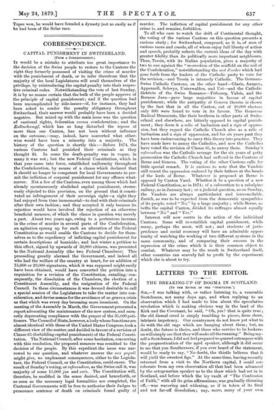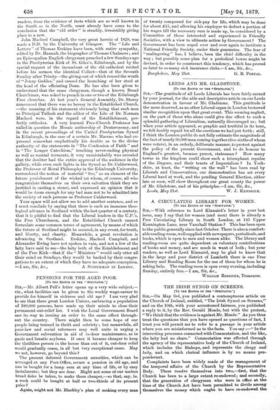LETTERS TO THE EDITOR.
THE BREAKING-UP OF DOGMA IN SCOTLAND. go ma EDITOR OF THE SPECTATOR:1 SIR, I was talking with, or rather listening to, a venerable Scotchman, not many days ago, and when replying to an observation which I had made to him about the speculative revolution which is making obvious way in the land of the Kirk and the Covenant, he said, " Oh, yes ! that is quite true ; the old dismal creed is simply tumbling to pieces, from sheer, intrinsic impotency. Our countrymen do not know yet what to do with the old rags which are hanging about them; but, no doubt, the future is theirs, and those who survive to be lookers- on will simply see that they will make all the running." Being my- self a Scotchman, I did not feel prepared to quarrel extempore with the prognostication of the aged speaker, although it did occur to me that you Southerners; if you ever heard of the statement, would be ready to say, " No doubt, the thistle believes that it will yield the sweetest figs." At the same time, having recently returned from a visit to the Northern capital, I could cor- roborate from my own observation all that had been advanced by the octogenarian speaker as to the thaw which had set in in Scotland, and before which the icy vault of "The Confession of Faith," with all its grim affirmations, was gradually thinning off,—was wavering and widening, as if in token of its final and not far-off dissolution; nay, more, many of your own.
readers, from the evidence of facts which are as well known in the South as in the North, must already have come to the conclusion that the "old order" is steadily, irresistibly giving place to a new.
John Macleod Campbell, the very great heretic of 1829, was made a D.D. by the University of Glasgow. The " Life and Letters" of Thomas Erskine have been, with entire sympathy, edited by Dr. Hannah, the biographer of Thomas Chalmers ; and an Episcopalian English clergyman preached a few Sundays ago in the Presbyterian Kirk of St. Giles's, Edinburgh, and by the special request of the incumbent of the old cathedral recited before his sermon the identical Collect—that of the Seventh Sunday after Trinity—the giving-out of which roused the wrath of " Jenny Geddes," and caused the launching of her stool at the head of the officiating Dean. He has also been given to understand that the same clergyman, though a known Broad Churchman, was asked to preach in one or two of the Edinburgh Free churches. At last year's General Assembly, Dr. Storey announced that there was no heresy in the Established Church, —the meaning of his statement obviously being that such men as Principal Tulloch and the editor of the Life of Dr. Norman Macleod were, in the regard of the Establishment, per- fectly orthodox. A very learned Free-Church Professor has called in question the Mosaic authorship of Deuteronomy, and in the recent proceedings of the United Presbyterian Synod in Edinburgh, in the case of a certain Mr. Macrae, who had ex- pressed somewhat emphatically his doubts as to the divine authority of the statements in " The Confession of Faith " and in " The Longer Catechism," touching never-ending physical as well as mental torments, it very unmistakably was revealed that the doubter had the entire approval of the audience in the gallery, while even such lights in the Synod as Dr. Calderwood, the Professor of Moral Philosophy in the Edinburgh University, surrendered the notion of material " fire," as an element of the future punishment of the wicked (at whom, of course, all who congratulate themselves on their own salvation think they are justified in casting a stone), and expressed an opinion that it would be doom enough for any bad man not to be admitted into the society of such persons as Professor Calderwood.
Your space will not allow me to add another sentence, and so I must conclude by saying that there is such an immense theo- logical advance in Scotland within the last quarter of a century, that it is pitiful to find that the Liberal leaders in the U.P.'s, the Free Churchmen, and the Established Church cannot formulate some common terms of agreement, by means of which the future of Scotland might be secured, in any event, for truth, and liberty, and charity. Meanwhile, a great revolution is advancing in Scotland. Erskine, Macleod Campbell, and Alexander Ewing have not spoken in vain, and not a few of the laity have said to me—the laity both of the Establishment and of the Free Kirk—that if the " Ministers " would only utter all their mind on Sundays, they would be backed by their congre- gations to an extent of which they have no adequate conception.



































 Previous page
Previous page